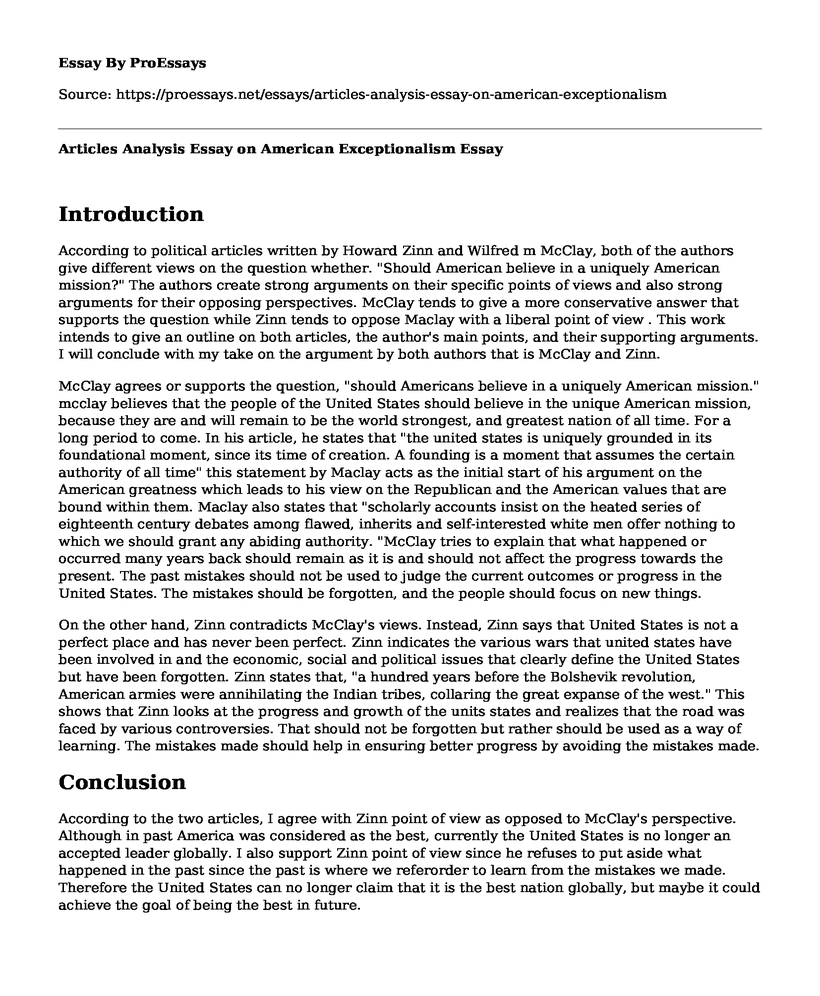Introduction
According to political articles written by Howard Zinn and Wilfred m McClay, both of the authors give different views on the question whether. "Should American believe in a uniquely American mission?" The authors create strong arguments on their specific points of views and also strong arguments for their opposing perspectives. McClay tends to give a more conservative answer that supports the question while Zinn tends to oppose Maclay with a liberal point of view . This work intends to give an outline on both articles, the author's main points, and their supporting arguments. I will conclude with my take on the argument by both authors that is McClay and Zinn.
McClay agrees or supports the question, "should Americans believe in a uniquely American mission." mcclay believes that the people of the United States should believe in the unique American mission, because they are and will remain to be the world strongest, and greatest nation of all time. For a long period to come. In his article, he states that "the united states is uniquely grounded in its foundational moment, since its time of creation. A founding is a moment that assumes the certain authority of all time" this statement by Maclay acts as the initial start of his argument on the American greatness which leads to his view on the Republican and the American values that are bound within them. Maclay also states that "scholarly accounts insist on the heated series of eighteenth century debates among flawed, inherits and self-interested white men offer nothing to which we should grant any abiding authority. "McClay tries to explain that what happened or occurred many years back should remain as it is and should not affect the progress towards the present. The past mistakes should not be used to judge the current outcomes or progress in the United States. The mistakes should be forgotten, and the people should focus on new things.
On the other hand, Zinn contradicts McClay's views. Instead, Zinn says that United States is not a perfect place and has never been perfect. Zinn indicates the various wars that united states have been involved in and the economic, social and political issues that clearly define the United States but have been forgotten. Zinn states that, "a hundred years before the Bolshevik revolution, American armies were annihilating the Indian tribes, collaring the great expanse of the west." This shows that Zinn looks at the progress and growth of the units states and realizes that the road was faced by various controversies. That should not be forgotten but rather should be used as a way of learning. The mistakes made should help in ensuring better progress by avoiding the mistakes made.
Conclusion
According to the two articles, I agree with Zinn point of view as opposed to McClay's perspective. Although in past America was considered as the best, currently the United States is no longer an accepted leader globally. I also support Zinn point of view since he refuses to put aside what happened in the past since the past is where we referorder to learn from the mistakes we made. Therefore the United States can no longer claim that it is the best nation globally, but maybe it could achieve the goal of being the best in future.
Bibliography
Bacevich, Andrew J. The limits of power: The end of American exceptionalism. Metropolitan Books, 2008.
Cant, John. Cormac McCarthy and the myth of American exceptionalism. Routledge, 2013.
Ceaser, James W. "The origins and character of American exceptionalism." American political thought 1, no. 1 (2012): 3-28.
Hodgson, Godfrey. The myth of American exceptionalism. Yale University Press, 2009.
Howard Zinn. The Power and the Glory: Myths of American Exceptionalism University Press, 2009.Harvey Mansfield. To the Heart of American Exceptionalism Wall Street Journal (Online); New York, 04 Feb 2011
Ignatieff, Michael, ed. American exceptionalism and human rights. Princeton University Press, 2009.
Markovits, Andrei S., and Steven L. Hellerman. Offside: soccer and American exceptionalism. Princeton University Press, 2014.
Nagareda, Richard A. "Aggregate Litigation Across the Atlantic and the Future of American Exceptionalism." Vand. L. Rev. 62 (2009): 1.
Pease, Donald E. The new American exceptionalism. U of Minnesota Press, 2009.
Rojecki, Andrew. "Rhetorical alchemy: American exceptionalism and the war on terror." Political Communication 25, no. 1 (2008): 67-88.
Cite this page
Articles Analysis Essay on American Exceptionalism. (2022, Jun 05). Retrieved from https://proessays.net/essays/articles-analysis-essay-on-american-exceptionalism
If you are the original author of this essay and no longer wish to have it published on the ProEssays website, please click below to request its removal:
- Political Philosophy Essay: Realism and Liberalism
- Essay Sample on Private Transportation and Fleet Management
- Essay on End Misconceptions: Government Steps to Stop Dental Myths
- Federalism & Intergovernmental Relations: Evolving Order - Essay Sample
- Essay Example on Decolonization and Cold War: The New Phase of Imperialism
- Paper Example on Gambling Defined: 3 Criteria Government Must Agree On
- Green Emergency: Deforestation Challenges and Legal Perspectives in Pakistan - Free Report







